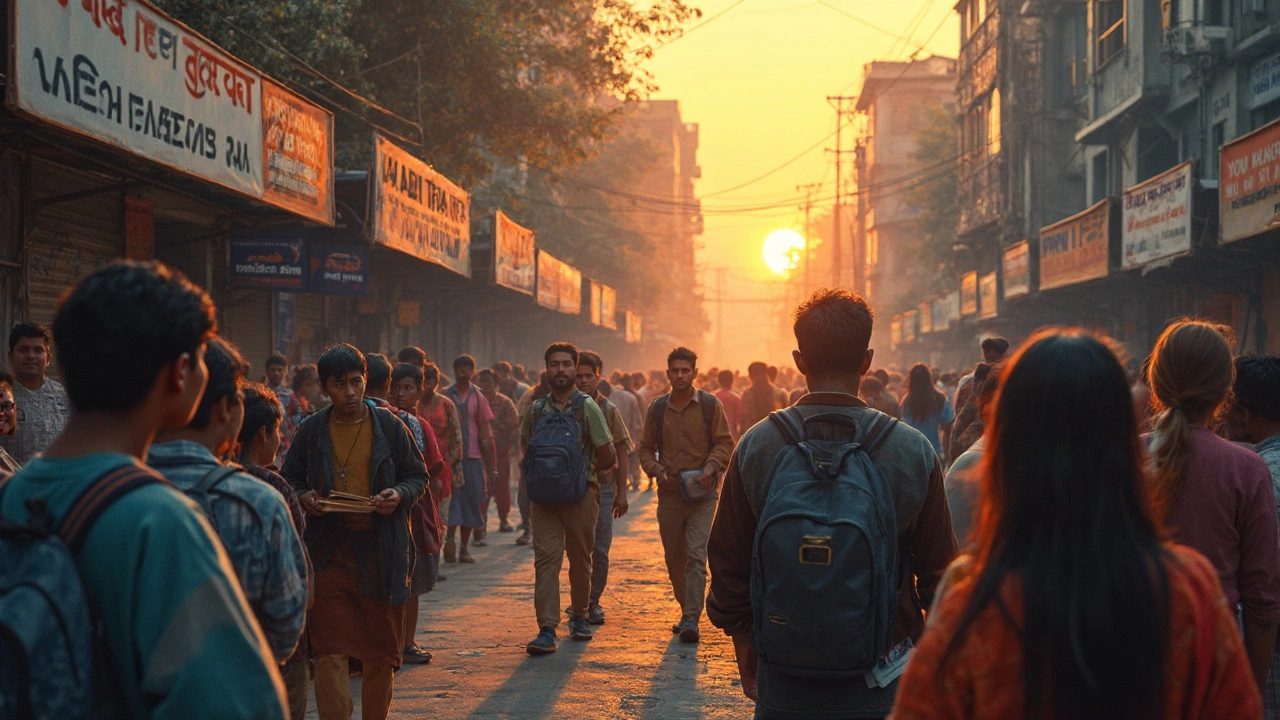
Some exams feel borderline impossible—not just because the questions are hard, but because millions of people want in and only a handful make it. If you’ve ever wondered what it really means for an exam to be “competitive,” you’re in the right place. It’s more than just brainpower. The real kicker is how few spots there are compared to the mobs who show up to try their luck.
If you look around the world, some acceptance rates will make your jaw drop. Imagine studying for years just to face odds of less than 1%. Still, people sign up every single year. Why? The promise of a big life change—fancy jobs, top universities, or sometimes just bragging rights. Stick around and you’ll see how different exams stack up, what pushes them to the extreme, and what you can actually do to survive the race.
- What Makes an Exam 'Competitive'?
- Global Showdown: Toughest Exams Around the World
- Inside India: The UPSC Civil Services & IIT-JEE Battle
- US & Europe: Ivy League Hurdles and Medical Madness
- Survival Tips: Beating The Odds
- Is It Worth It? Looking Beyond The Hype
What Makes an Exam 'Competitive'?
So, what actually makes an exam get slapped with the label “competitive”? It’s not just the difficulty of the questions. It’s the crazy mix of low acceptance rates, huge numbers of applicants, brutal scoring systems, and sometimes even a bit of unpredictability thrown in for good measure. Basically, when you hear stories about people spending years prepping and still not getting in, you know you're looking at the real deal.
Let’s put it simply. If 2 million people are competing for a few thousand seats, like in India’s IIT-JEE or UPSC Civil Services, the math alone cranks the competition to wild levels. But there’s more to it:
- Exam difficulty: Some tests aren’t just about memorizing facts. They demand problem-solving, creativity, and thinking under pressure. The SAT and ACT in the US are tough, but compare that to Japan’s University of Tokyo entrance exam and you’ll see the bar for “tough” shifts depending on country.
- Number of applicants: More people fighting for the same spot means you need to be practically perfect, not just smart. For example, the average acceptance rate for the UPSC is less than 0.2%.
- Preparation time: Some exams require years of dedication. For the Gaokao in China, students regularly pull 12-hour study days leading up to the exam.
- Scoring system: In some exams, even a single mistake can cost you your dream job or college seat. High-stakes scoring makes every mark count and pushes stress levels sky-high.
- Role of luck: Sometimes, tie-breakers, quotas, or surprise sections mean the outcome isn’t entirely in your control. That randomness can add another layer of anxiety.
When people talk about the competitive exams scene, they’re really talking about tests where every tiny edge or bit of effort matters. If you want to beat the competition, you’re not just fighting with what’s in your books—you’re up against a system that’s designed to pick out only the best of the best, no matter where they’re from.
Global Showdown: Toughest Exams Around the World
When people talk about hardcore competitive exams, a few big names always come up. These tests aren't just about nailing questions—they test your stamina, memory, and willpower. The real kicker is millions sign up, but only a tiny number walk away winners. Let's check out the exams that make students sweat across the globe.
- Gaokao (China): This one's called the “make or break” exam for a reason. Over 12 million Chinese high schoolers take it each year, but less than 1% get into the nation’s top two universities. Mess up, and your dream college is out the window. The stress is so legendary that some hospitals set up special counseling wards just for Gaokao season.
- UPSC Civil Services (India): Hailed as one of India’s hardest, it’s not just about how much you know but also how you think on your feet. Out of roughly a million hopefuls, fewer than 1,000 get selected for top jobs in government. A grind that lasts for over a year, from the first paper to the final interview.
- All Souls Prize Fellowship Exam (UK): Try writing a thesis-length essay on the word “Innocence” with zero warning. Oxford’s All Souls exam takes only two people a year, sometimes none. The selection rate is so tiny, it feels like a lottery for geniuses.
- United States Medical Licensing Exam (USMLE): Future doctors in America can’t escape this beast. Even medical school grads sweat bullets over Step 1. Fail, and you hit pause on your medical career dreams.
Here’s a quick stat sheet to see just how fierce the competition gets:
| Exam | Country | Annual Candidates | Acceptance Rate |
|---|---|---|---|
| Gaokao | China | 12,000,000+ | <0.5% (Top Tier) |
| UPSC Civil Services | India | 1,000,000+ | ~0.1% |
| All Souls Prize Exam | UK | 80–100 | 2% (Some years, 0%) |
| USMLE Step 1 | US | ~60,000 | 85–90% (but retake limits and career impact raise stakes) |
These tests aren’t just about how smart you are—they reward people who show up with grit, prep, and a cool head. Usually, beating these odds means careful planning, finding the right mentors, and plenty of practice tests. Forget shortcuts. The stories out there prove you only make it if you stick with it, one step at a time.
Inside India: The UPSC Civil Services & IIT-JEE Battle
When folks talk about competitive exams in India, two names pop up almost every time—UPSC Civil Services and IIT-JEE. These are the gold standards for 'tough' in India. We're talking about a situation where millions apply, but just a handful actually make it. That's not an exaggeration. Let’s break down what makes these exams legendary (and kind of terrifying).
The competitive exams scene in India is wild. For the UPSC Civil Services Exam—which decides who gets to work as some of the country’s top government officials—over 1 million people register each year. But only around 1,000 get selected. The IIT-JEE, which is the main gatekeeper for entry to the best engineering colleges (IITs), sees a similar cutthroat vibe.
| Exam Name | Number of Candidates (2024) | Selection Rate |
|---|---|---|
| UPSC Civil Services | 1,100,000 | ~0.1% |
| IIT-JEE Advanced | 180,000 (qualified for Advanced from 1.4M in Main) | ~0.5% accepted to IITs |
An ex-UPSC topper, Tina Dabi, put it like this:
"Cracking UPSC isn’t just about being smart. It’s consistency, discipline, and staying calm when it feels like everything's against you."
The question patterns make things even tougher. For UPSC, you must be good at current events, history, politics, ethics—basically, you need to know a little about everything. With IIT-JEE, it’s all about deep problem-solving in math, physics, and chemistry. These questions aren’t just hard, they often twist basics in ways you would never expect.
Want to survive this fight? Here’s what works for people who make it through:
- Start early: Two to three years of consistent prep is the norm, not the exception.
- Reliable sources: Don’t rely on random online notes—stick to books recommended by toppers (like NCERTs, previous years’ papers).
- Mock tests: Simulating real exam pressure helps you think straight when it matters.
- Time management: Make a plan and actually stick to it. Break big goals into smaller, daily targets.
So, if you hear someone brag that they beat UPSC or IIT-JEE, they’ve basically done the academic equivalent of climbing Mount Everest. It’s that big a deal—not just in India, but across the world.

US & Europe: Ivy League Hurdles and Medical Madness
If you think competitive exams are tough, try getting into a top school in the US or Europe. The Ivy League is what everyone hears about—Harvard, Yale, Princeton, and a few more. These colleges get tons of applications every year, but let in only a tiny fraction. For 2025, Harvard admitted just 3.6% of its applicants. That means out of every 100 hopefuls, less than 4 get the golden email. And it's not just about grades—they’re checking your essays, activities, and test scores. It’s like jumping through hoops on a moving treadmill.
Now, slide over to medical school. If you want to do medicine in the US, the MCAT exam is your first roadblock. You can't just “pass” the MCAT; your score decides if you even get an interview. There were over 55,000 medical school applicants in the US last year, but just around 22,000 made it in. And in Europe, especially the UK, the story’s the same. Oxford and Cambridge run their own brutal entrance tests, and for medicine, you have to tackle exams like the UCAT or BMAT, then hope your school results look amazing too.
Here's a breakdown of some tough numbers for these famous spots:
| Exam/School | Applicants | Acceptance Rate |
|---|---|---|
| Harvard Undergraduate | 56,937 | 3.6% |
| Yale Undergraduate | 57,465 | 4.4% |
| US Medical Schools (All Combined) | 55,188 | ~40% |
| Oxford (Medicine) | 2,054 | 8.8% |
| Cambridge (Medicine) | 1,918 | 14.6% |
One classic mistake? Focusing too much on raw scores and not enough on the whole package. These competitive exams want more than people who just test well. A killer application mixes solid grades, a smart strategy, and honest stories—yep, you need to show you’re more than just a number. Europe’s top universities like Oxford, Cambridge, and even ETH Zurich have their own processes, but they all share one thing: they make you hustle hard for a spot.
- Don’t ignore extracurriculars or interviews—they matter, often as much as exam results.
- Practice old test papers. A lot. Most questions are high-pressure and time-limited.
- For medicine, get real work experience—volunteering, internships, even shadowing a doctor counts.
- Application deadlines in Europe can be way earlier than you think. Start prepping documents months ahead.
So sure, these schools might look like distant castles, but with the right game plan, you’ve got a real shot. Eyes wide open, prep like it’s a sport, and don’t be afraid to ask for help. People get in every year—their secret is usually a combo of hard work, strategic thinking, and a pinch of luck.
Survival Tips: Beating The Odds
About to take one of the competitive exams everyone dreads? Don't just cross your fingers and hope for the best. Success comes down to smart planning and knowing what’s worked for the winners before you.
First, consistency matters a lot more than cramming. People who scored top ranks in the UPSC Civil Services or cracked exams like the SAT or IIT-JEE almost always have a set routine—studying a few hours every day, rather than panicking right before. The trick is using spaced repetition. Even a two-hour daily slot, every day, packs more punch than a wild 12-hour sprint once a week.
Know your enemy. Study the actual format—get real with old papers and practice tests. For example, 85% of top scorers in NEET or MCAT say they practiced with at least five complete past papers. This helps you spot favorite question patterns and gets you used to real exam pressure.
- Break big topics into small, chewable bits. Set micro-goals for each study session so you never sit down confused about what to cover.
- Don’t skip mock tests. These aren’t just a formality. A study on JEE toppers found those who took at least ten full-length mocks improved their final scores by up to 17%.
- Use active recall instead of just re-reading notes. Quiz yourself, explain answers out loud, or teach a friend. This locks information in for the long haul.
- Your phone can be an ally—or your enemy. Use focus apps to block distractions while you study. Even 15 minutes of phone scrolling can mess up your concentration for much longer.
- Make use of legit online resources. For example, Khan Academy, Coursera, and free practice apps cover most test types with no extra cost.
Finally, don’t ignore your body. Quick walks, a bit of stretching, and getting decent sleep will keep your brain working. Studies show students who sleep well score up to 10% better than night owls who pull all-nighters. When things get overwhelming, taking a short break is way better than pushing through with zero focus. So, combine strategy with self-care for best results. That’s how you actually beat the odds.
Is It Worth It? Looking Beyond The Hype
People stress over competitive exams for good reason—they can open doors to jobs, colleges, and even social status. But here’s the thing: just chasing the toughest exam without knowing if it fits your goals can leave you burnt out, broke, or just plain unhappy. So before you jump in, ask yourself what you’re really after. Is it a job with job security, a spot in a top university, or just wanting to prove you can crack something tough?
Let’s check out some facts that usually get ignored in the hype. Sure, clearing the UPSC in India can land you a prestigious government job, but did you know the success rate is less than 0.2%? In the US, passing the MCAT and getting into med school might sound flashy, but about 60% of applicants end up rejected each year. And then there’s South Korea’s Suneung exam—just one day, once a year, and the entire country basically shuts down for it. The pressure is so high that around 14% of students repeat the exam for another shot.
| Exam | Success Rate | Typical Motivation |
|---|---|---|
| IIT-JEE (India) | ~1% | Engineering jobs, social prestige |
| UPSC (India) | ~0.2% | High-status govt jobs |
| Gaokao (China) | Varies (Top Univs: <0.5%) | Top college spots |
| SAT to Ivy League (USA) | <7% for top schools | Elite college entry |
| Suneung (South Korea) | Varies | Top universities, family honor |
| MCAT (USA) | ~40% entry to med school | Become a doctor |
Now, here’s the other side. Most people who take these exams won’t get in their first try, or ever. Some get what they want, but plenty end up switching to totally different careers and end up just as happy. The myth that only the toughest exams lead to a good life isn’t real. Many folks find more satisfaction (and sometimes more money) by picking a different route.
- Get honest about your motivation—don’t do it just because of what others expect.
- Check what happens to people who don’t clear the exam—what paths did they take after?
- Think about mental health—the anxiety and competition can get brutal. If you feel stretched thin already, pause and rethink your options.
If you’re facing a big exam, block out the buzz for a minute. Ask what you want and remember—there are a hundred ways to reach a good place in life. One exam doesn’t decide it all.




